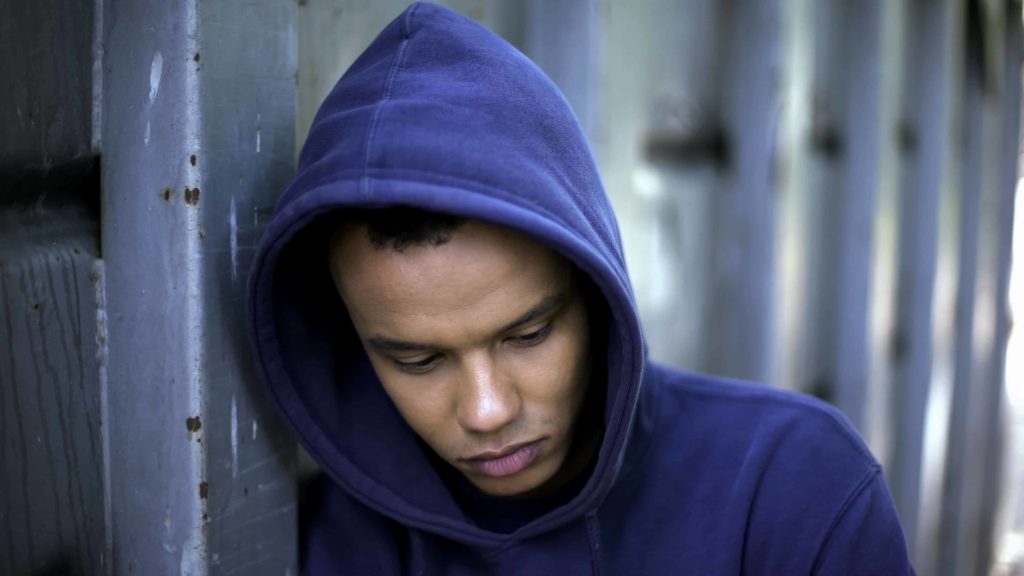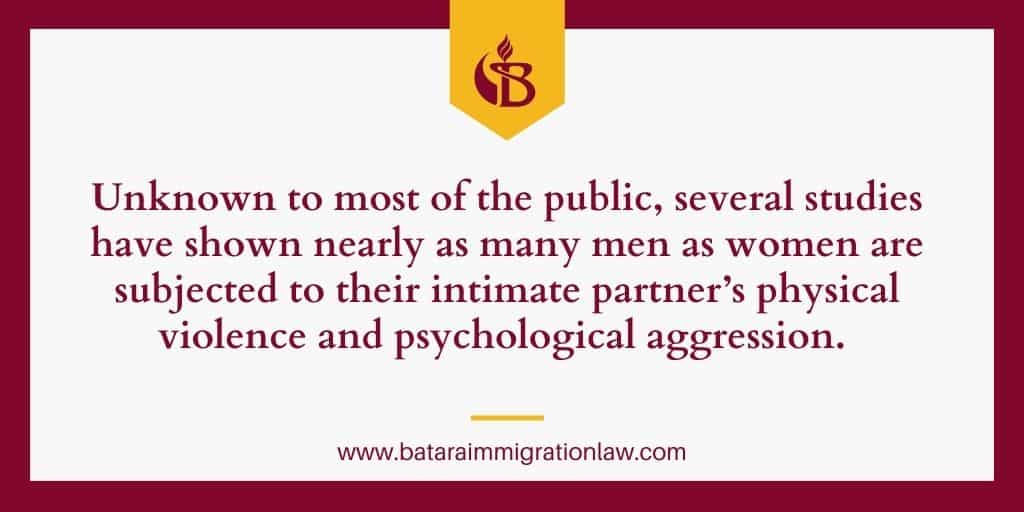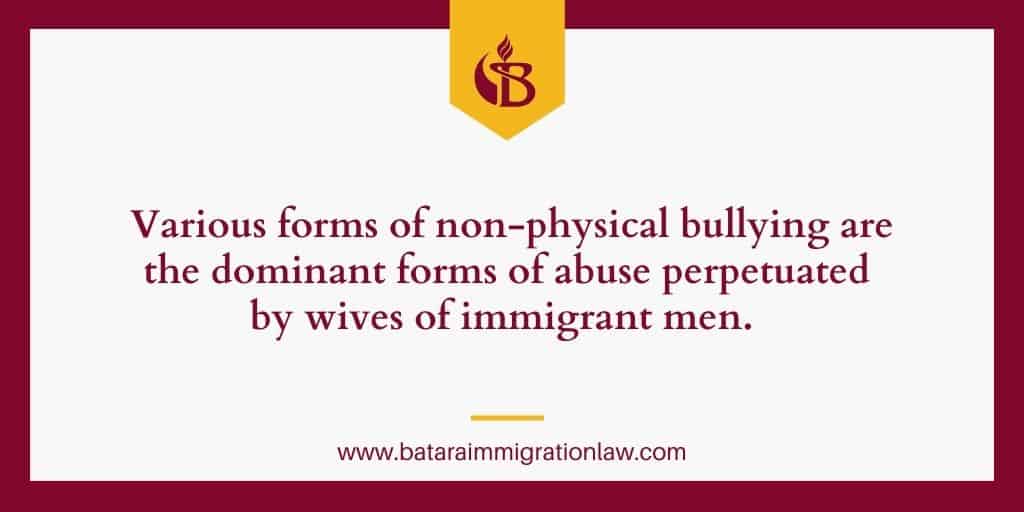
Are immigrant males ever the victim of domestic violence?
Sure.
Is there any program to help them?
Yes.
It’s called the Violence Against Women Act.
Most folks think the Violence Against Women Act as a female-only immigration program.
It’s not.
Despites its name, VAWA provides protection not only to immigrant women, but also to immigrant men and children who suffer physical harm or extreme cruelty at the hands of their U.S. citizen or lawful resident spouses.
Hidden Victims Of Domestic Violence
Unknown to most of the public, several studies have shown nearly as many men as women are subjected to their intimate partner’s physical violence and psychological aggression.

Reports from the Centers for Disease Control and Department of Justice have suggested that up to 40% of all domestic abuse cases pertain to male victims.
According to the National Coalition Against Domestic Violence (NCADV), 1 in 3 women and 1 in 4 men have experienced physical violence perpetuated by an intimate partner, such as slapping, shoving, and pushing.
In general, accurate figures for domestic violence involving only U.S. citizens are hard to ascertain. For reasons explained below, the numbers for males and immigrants are more difficult to determine.
As a immigration lawyer who handles VAWA cases, I have helped more immigrant male victims of domestic cruelty, abuse, and physical violence than I care to admit.
Here are a few examples.
The Marginalization Of Immigrant Males In Mixed-Status Marital Relationships
While Dennis, an immigrant from Ghana, waited for his wife’s marriage petition and green card application to be processed, his wife became upset about their financial struggles.
She began to blame him for their situation. Saying that if he could not pay for household expenses, he was not entitled to sleep in their bed or on their couch, she forced him to sleep on the floor besides the bed.
She put a lock on the refrigerator and would only let him eat what she allotted him as his daily ration. She limited him to less expensive food items when she unlocked it after she returned from work.
She removed him from all bank accounts and credit cards in their joint name and would not let him have any friends.
**********
Ricardo, an immigrant from Honduras, was afraid to call the police when his wife, angry that he had not cut the grass the day before, poured boiling hot water on him whlle he took a nap without his shirt on, causing severe burns to his back, neck, and shoulders.
Neighbors who heard them screaming called for emergency law enforcement help. They assumed he was abusing his wife.
When the police officers arrived, they took down information. They learned his wife was a U.S. citizen, Ricardo an undocumented immigrant.
Based on his wife’s alibi, she was not taken into custody. They discounted the burns on Ricardo’s body. Believing his wife’s actions were in self-defense, they took Ricardo into custody and a restraining order was issued against him.
**********
Mustafa, an immigrant from India, met his wife, a manager at a pizza shop just around the corner at his apartment in Moreno Valley. He would eat there several times a week. They became friends. Less than two months after they met, she moved in with him.
Later that year, they married. She quit her job. She began to insult him in front of her family and friends.
On Valentine’s Day, she became angry when he could not afford to take her to a nice restaurant. She started yelling and cursed at him. She left the house, scratching his car on the way out with her keys.
A few weeks later, she returned with a male and demanded money. When Mustafa refused, she attacked him. She tore his shirt, bit him, and with her nails, scratched his face and chest. Her companion threatened to stab him with a knife.
**********
Working as a skydiver instructor in Florida, Dorin, an immigrant from Romania, met his wife while providing lessons. They exchanged numbers. They married a year later.
His wife graduated from nursing school and was hired at a local hospital. Shortly after, Dorin was offered a well-paying position in Nevada. His wife did not want to move. They agreed he should take the job for a year or two, as he would earn enough to pay off her loans, and save to buy a house. Every other week, he would send his checks to her.
Their communications became sporadic. As their anniversary neared, he decided to surprise her with a visit.
The apartment was vacant. She was not working at the hospital. When she returned his telephone call, he learned she was with another man and pregnant. Two weeks later, he received a notice that his immigration case had been denied due to her withdrawal.
**********
Fortunately, we were able to help Dennis, Ricardo, Mustafa, and Dorin win lawful permanent resident status.
Utilizing various aspects of the Violence Against Women Act regulations, each one of them was able to overcome domestic abuse and defeat government efforts to deport them.
Why Are Immigrant Males Overlooked As Domestic Abuse Victims?
There are many reasons why domestic abuse to immigrant males is relatively unknown by the public.
Understanding these reasons is the key to helping thousands of abused immigrant males find the courage to come out of the shadows and seek the assistance they need.
Various studies have pinpointed the following factors.
First, many men find it difficult to admit they are in an abusive relationship.
Infidelity and abandonment are difficult emotions to process and acknowledge for male or female.
Following gender norms, most males do not want to admit such failures. They do not tell their co-workers, friends, or family members.
One study noted that almost 1/2 of all male victims (49%) fail to tell anyone they are a victim of domestic abuse By comparison, 19% of female victims do not tell anyone.
For instance, Dennis confided when he was forced to sleep on the floor, not allowed to eat the same foods as his wife, nor have access to friends or money, he felt like a slave.
Yet, he had been raised to believe that real men don’t cry or whine.
Such domestic violence victims often feel that others will see them as “less of a man” for not having the strength to put an end to the abuse they suffer.
Second, when physical abuse occurs to immigrant males, it is often hard to document and to prove to the police and law enforcement authorities.
Most abused immigrant males do not seek medical or psychological treatment, absent extreme emergencies. Men avoid giving off signs they have been abused, keeping others from asking.
In many locations, treatment for domestic violence is limited to female victims. There are few, if any, shelters for abused men.
Moreover, even where such centers for abused men exist, their services are not well-publicized or understood by undocumented immigrants.
Third, many domestically abused immigrant males fear being reported to immigration authorities by their spouses.
As several studies have confirmed, immigrant male victims do not report the incident to law enforcement due to worries about their legal status.
Immigrant male victims of abuse are dependent upon their spouses to legalize their status in the United States.
Because they fear spouses will abandon their petitions and, worse, notify ICE about their unlawful status, they opt to remain silent rather than risk retaliation.
Fourth, many immigrant males who have experienced domestic violence fear a gender bias of law enforcement officers and other professionals.
Male victims fear not only an immigration bias, but also a gender bias.
The vast majority do not seek counseling. They do not look for social services that will help them. They do not alert police.
They fear their wives will twist the story and as women, their stories are more likely to be believed, leading to the immigrant being the party who gets blamed, then arrested, after which they are placed in deportation proceedings.
Take Mustafa. He was too afraid to call the police when his wife and an unknown male physically assaulted him.
Nor did he tell his friends or co-workers what happened. Like other male victims, he did not think about taking pictures of his injuries and documenting his wife’s physical abuse.
Ricardo, too, refrained from calling 911. After being burned by his wife, he did not call the police.
Yet neighbors did.
Both his neighbors and law enforcement offices assumed he abused his wife. He was taken in custody and turned over to immigration officials.
VAWA For Immigrant Males: Shining A Light On Female Abuse And Violence
The primary types of abusive behaviors by women generally differ from those exhibited by men.
Although female outrage includes physical violence like hitting, biting, kicking, spitting, punching, throwing things, and destroying possessions, various forms of non-physical bullying are the dominant forms of abuse perpetuated by wives of immigrant men.

They are no less damaging to a victim’s sense of self-worth.
Verbal attacks, emotional blackmail, social rejection, withholding of affection, economic control, and isolating are common in female as abuser situations.
Such actions are often tied to infidelity and abandonment. For many immigrant men, this imposes an additional layer of humiliation and shame tied to their lack of legal status and reluctance to seek professional assistance.
When Dorin approached our office, it took every ounce of resilience for him to ask for our help. He wanted to live in the United States. His optimism had been greatly sapped.
After several discussions, we were able to convince him not to give up.
Proving domestic abuse and extreme cruelty, if not physical violence, by a female spouse is a difficult task – especially when the victim has not called the police, has not sought out counseling, and has not applied for social services.
Yet, like the predicament of abused women, domestic violence suffered by males must be called out and challenged.
Two things need to happen.
Men must be willing to share their stories.
And we, the public, must be prepared to acknowledge that domestic violence is not solely a woman’s issue.
After all, putting it bluntly, domestic violence on any person, male or female, child or adult, is wrong.
By Carlos Batara, Immigration Law, Policy, And Politics




